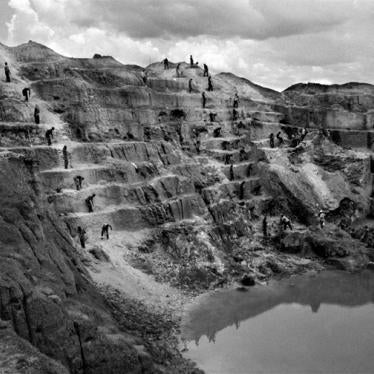A few weeks ago, in a quiet corner of a hotel in Kinshasa, the Democratic Republic of Congo's capital, a militia leader told me that 6,000 of his armed men had recently taken control of a gold mine in the north.
He reckoned that he could sell 5kg of gold from his new mine for $50,000 (£30,000). He said it would be traded for guns. According to countless reports, those guns, in turn, are used to massacre civilians. Human Rights Watch has documented many of these attacks where men, women and children are brutally killed, raped or mutilated.
The drive to control the DRC's vast mineral wealth has been a prime motive for the war. Multinational companies and the DRC's neighbours are accused of profiteering from the war, yet the UN Security Council has taken no action. The war has left more than three million people dead in the past five years.
The DRC is blessed or in this case cursed with some of the world's largest diamond reserves, rich gold fields, as well as huge reserves of cobalt and coltan (a mineral used in laptops and mobile phones). All the warring parties have exploited these reserves to finance their military operations and buy weapons, often committing serious human rights abuses in the process. A peace process has begun but the deadly business practices persist.
Companies in Britain are among the 85 accused of ignoring fundamental principles and international standards of good practice as laid down in the Guidelines for Multinational Enterprises from the Organisation for Economic Co-operation and Development, which spell out how companies should behave. And Britain has failed to investigate even one of them.
Britain has also failed to confront the DRC's neighbours, Uganda and Rwanda, who have funded and supported Congolese rebel groups. In the decade before Ugandan troops arrived in the DRC, for example, Uganda exported few diamonds but, once Ugandan soldiers were on the spot, it sold diamonds abroad worth millions of dollars. Rwanda multiplied its exports of coltan in the same way.
Uganda and Rwanda have now pulled their troops out of the DRC but they have reportedly kept their economic links with the warlords. It is precisely this murky trade that destroys Congolese lives and undermines hope for the peace process.
Looking the other way guarantees continued profits for a few and continued horror for the many.







